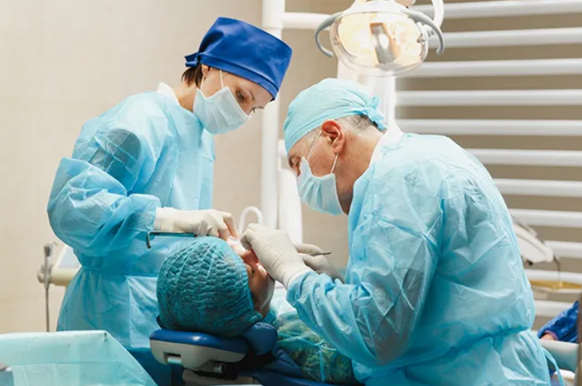
Patients often ask their oral and maxillofacial surgeon (OMS) if it’s necessary to have all four wisdom teeth extracted even though the teeth might not yet be visible inside the mouth or they have erupted without any known problems. The decision can be difficult. Even if all four wisdom teeth are free of infection and not causing pain – or if only one tooth is problematic – an OMS may still recommend they all be removed.
Wisdom Teeth Management: Why Remove All 4
Because of their location in the back of the mouth, wisdom teeth are frequently difficult to keep free from plaque and food and might trap harmful bacteria that can contribute to gum disease, decay and infection. Even wisdom teeth that are buried under the gum tissue may cause these same issues. But why not adopt a wait-and-see approach to wisdom teeth coming in (or yet to erupt) that haven’t caused any trouble? Here are some items to consider:
- Typically, it is easier to remove wisdom teeth in younger patients because the roots of the wisdom teeth are not completely formed, surrounding bone is softer and there is less chance of damaging nearby nerves or other structures. Overall risk of surgical complications is more common in adulthood.
- Each visit will take more of a patient’s time, including time off from school or work.
- Each additional visit for a tooth extraction requires an additional healing period with a restricted diet.
- Properly caring for any remaining wisdom teeth requires routine inspections and X-rays.
- It can be more expensive to visit an OMS multiple times for additional wisdom tooth extractions should they become problematic later.
For these reasons, you and your oral surgeon should discuss whether you should have all four wisdom teeth extracted at the same time.
Risks of Keeping Wisdom Teeth
The decision not to extract wisdom teeth is reasonable in some circumstances and should be made by the patient, a guardian/parent (if applicable) and the oral and maxillofacial surgeon. However, the patient must understand wisdom teeth that are not removed can:
- Cause damage to neighboring teeth.
- Develop pathology such as cysts, abscesses and tumors.
- Develop cavities that can’t be restored.
- Lead to infections and other periodontal disease.
Article Courtesy of AAOMS, https://myoms.org/
All procedures performed at Pottstown Oral Surgery can be done under general or local anesthesia. Click here to learn more about us.